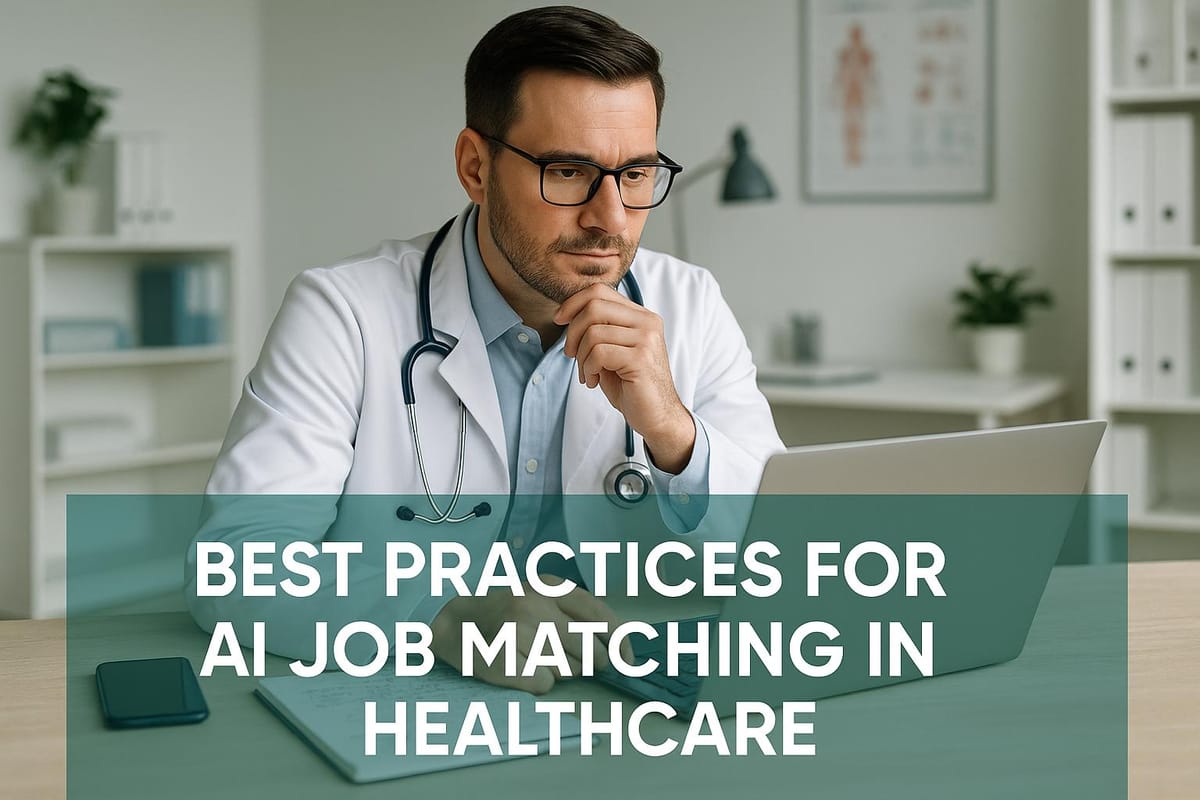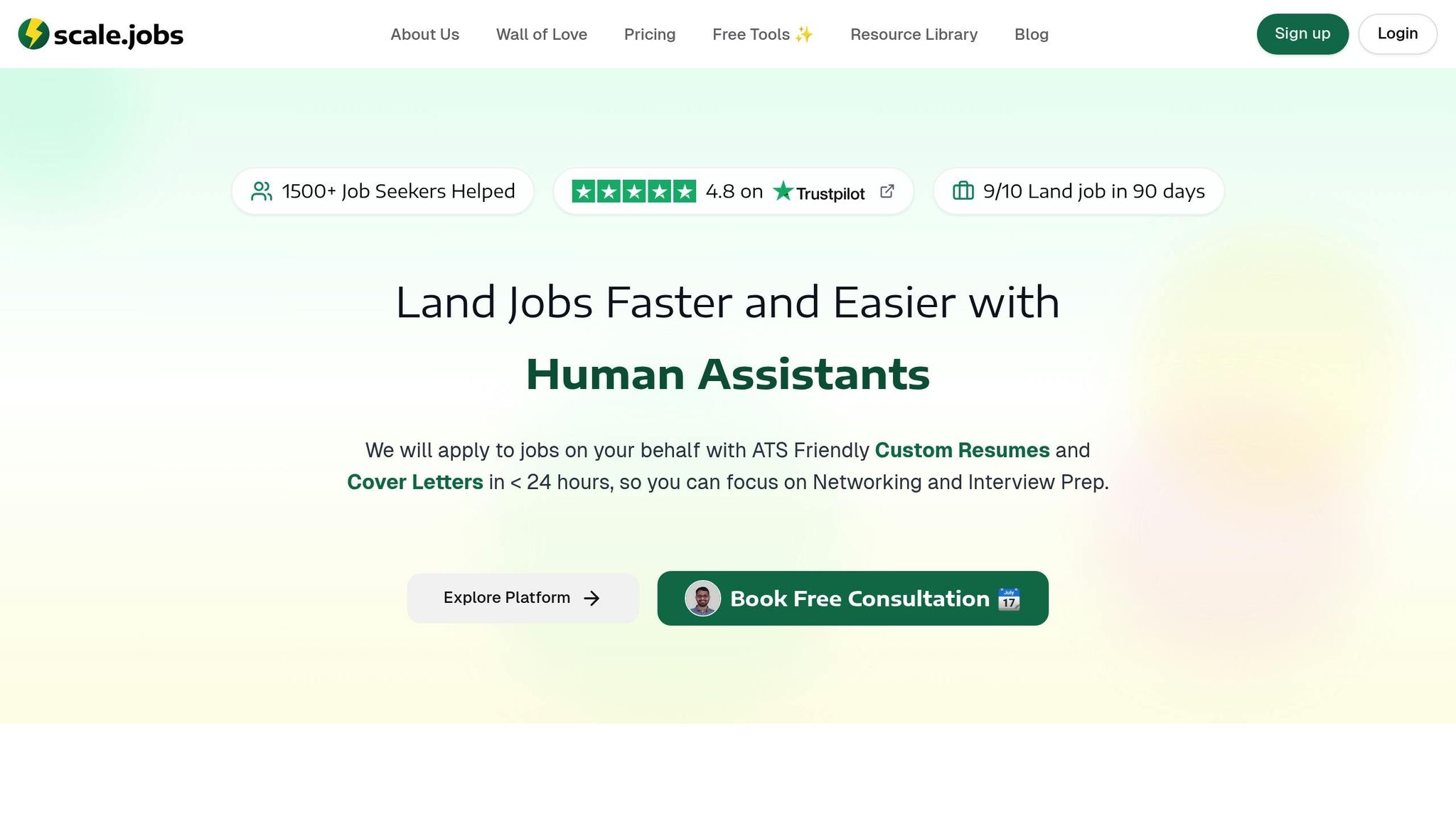Best Practices for AI Job Matching in Healthcare
Explore how AI is revolutionizing healthcare job matching, enhancing recruitment efficiency and improving candidate retention through tailored strategies.

AI is transforming healthcare hiring by addressing staffing shortages and improving recruitment efficiency. With healthcare jobs expected to grow by 13% by 2031, traditional methods struggle to keep up. Here’s how AI is reshaping the process:
- Faster Hiring: AI reduces time-to-hire by 50%, saving costs and filling critical roles quicker.
- Better Matches: Advanced algorithms align candidates’ skills, certifications, and preferences with job requirements.
- Retention Boost: AI identifies dissatisfaction early, improving employee retention by 25%.
- Simplified Compliance: Automates license verification and ensures hiring meets healthcare regulations.
For job seekers, AI tools optimize resumes for ATS, personalize applications, and track job submissions. Recruiters benefit from tailored platforms like Scale.jobs, which combines AI with human oversight for precise hiring in healthcare.
AI isn’t just a tool - it’s becoming essential for tackling the complexities of healthcare recruitment.
Winning the AI Race in Healthcare Recruiting: Build Your Playbook
Job Seeker Checklist: Using AI Tools for Healthcare Job Matching
Navigating certifications, licensing, and technical requirements can be overwhelming for healthcare job seekers. AI tools can simplify this process, helping you stand out in a competitive field. Here's how to make the most of them.
Make Your Resume ATS-Friendly
Applicant Tracking Systems (ATS) are often the first hurdle in healthcare hiring. These systems scan resumes for specific keywords, proper formatting, and relevant qualifications, filtering out many applications before they even reach a recruiter. That’s why ensuring your resume is ATS-compatible is crucial.
Healthcare resumes come with unique challenges. Details like medical certifications, clinical rotations, and specialized training need to be presented in a way that ATS can easily process. Tools like Scale.jobs’ ATS Resume Checker can help. This free tool analyzes your resume against healthcare-specific requirements, identifying missing keywords, formatting issues, and other gaps. Unlike generic resume checkers, it’s designed to understand healthcare terminology and certification details.
Here are some tips to make your resume ATS-friendly:
- Use standard headers such as Clinical Experience, Certifications, and Education. Avoid creative or unconventional headings.
- Include critical information like medical license numbers, certification dates, and exact job titles from postings.
- Highlight measurable achievements. Instead of saying, "provided patient care", go for something like, "Managed care for 15–20 patients per shift in a 40-bed ICU unit." Both ATS systems and hiring managers value specific, quantifiable accomplishments.
Once your resume is ATS-ready, take it a step further by tailoring it to each role.
Use AI to Personalize Applications
Generic resumes and cover letters rarely stand out in healthcare job applications. Each position often requires a unique blend of certifications, skills, and experience. AI tools can help you craft tailored application materials that align with the specific demands of each job posting.
For example, Scale.jobs’ AI Assistant Pro specializes in customizing resumes and cover letters for healthcare roles. It analyzes job descriptions and highlights the most relevant aspects of your experience.
Here’s how it works:
- For an ICU nursing role, the AI might emphasize your critical care certifications, ventilator experience, and ability to handle high-acuity patients.
- For a pediatric position, it could focus on your PALS certification, expertise in child development, and experience communicating with families.
The tool also generates personalized cover letters, addressing specific job requirements and even referencing the healthcare facility’s values, departments, or technologies. It ensures your application feels authentic and aligned with the employer’s needs.
Additionally, the AI can help you craft responses to common application questions like, “Why do you want to work at our facility?” or “Describe your experience with electronic health records.” These answers are tailored to your background and the employer’s preferences, saving you time while maintaining a personal touch.
Once your applications are polished, staying organized is the next step.
Track and Manage Applications
Applying to multiple healthcare jobs can get overwhelming fast. Without a system, it’s easy to lose track of deadlines, follow-ups, or interview dates. A centralized tracker can help you stay on top of everything.
Scale.jobs’ Job Applications Tracker is a free tool designed to simplify this process. It consolidates all your applications into one dashboard, automatically logging submissions made through Scale.jobs. Here’s what it can do:
- Send reminders for follow-ups, interview prep, and even certification renewals.
- Track the status of each application, including interview dates and next steps.
- Set up email alerts for new job postings that match your criteria, helping you act quickly on specialized or travel roles that fill up fast.
The tracker also provides insights into your job search. For instance, it can help you identify which types of facilities or geographic areas respond most positively to your profile. You might discover that community hospitals are a better fit than larger academic centers, allowing you to refine your strategy.
Lastly, the tracker lets you manage networking contacts - like recruiters, hiring managers, and other professional connections - all in one place. Since referrals and strong relationships play a key role in healthcare hiring, keeping these contacts organized is essential for long-term success.
Recruiter Checklist: Using AI for Healthcare Hiring
Hiring in the healthcare industry comes with its own set of challenges that generic AI tools often fail to address. From verifying medical licenses to understanding specialized certifications, recruiters need tools specifically designed to meet the intricate demands of healthcare staffing.
Choose an AI Platform Tailored for Healthcare
Generic AI tools often fall short when it comes to healthcare hiring. Why? Because they don’t account for the unique requirements like certification verification, licensing checks, and compliance with federal regulations. That’s where healthcare-focused platforms come into play.
Take Scale.jobs, for example. It’s built with healthcare recruitment in mind, offering features that understand medical terminology, certification requirements, and licensing nuances across states. For instance, when screening candidates for a cardiac catheterization lab technician role, the platform can differentiate between basic credentials and advanced certifications - something general-purpose tools struggle with.
Beyond its AI capabilities, Scale.jobs incorporates a human assistant component. These assistants are trained in healthcare hiring processes, helping recruiters meet tight timelines for critical roles like travel nursing or emergency care staffing.
Here’s what sets Scale.jobs apart:
- It integrates a healthcare-specific job board with AI-driven candidate matching.
- It includes human oversight, offering real-time updates via WhatsApp.
- Its ATS Resume Checker streamlines resume adjustments, saving recruiters time and speeding up the hiring process.
Once you’ve chosen the right AI platform, the next step is balancing automation with human judgment.
Combine AI Efficiency with Human Insight
AI is great for handling large volumes of applications and identifying candidates who meet basic qualifications. But healthcare hiring often involves nuances that only human judgment can address. With high stakes and strict regulations, final decisions should always involve a human touch.
Use AI to streamline the initial screening process. Set filters for non-negotiable requirements like active nursing licenses, BLS certification, or specific ICU experience. This helps weed out unqualified candidates so your team can focus on top prospects.
However, human review is critical for the final stages. AI might flag a candidate for a gap in employment, but a recruiter can uncover that the gap was due to additional training or family responsibilities. Similarly, while a candidate may meet all technical requirements, they might lack essential soft skills or cultural fit - factors that only a human interviewer can assess.
Scale.jobs’ hybrid model excels in this area. Its AI handles initial candidate matching and resume optimization, while human assistants manage application submissions and provide updates via WhatsApp. This ensures applications are submitted correctly across different hospital systems and ATS platforms, minimizing errors that could disqualify strong candidates.
This approach shines in high-volume recruiting scenarios like travel nursing or seasonal staffing for flu clinics. AI quickly identifies candidates with the right credentials and availability, while human reviewers evaluate communication skills and cultural fit during phone screenings.
Monitor AI Tools for Bias and Compliance
Healthcare hiring operates under strict federal regulations, and AI tools can unintentionally introduce bias or compliance issues if not properly monitored. Regularly auditing your AI systems is crucial - not just to avoid legal trouble, but to ensure fair hiring practices.
Start with HIPAA compliance. Any AI tool processing healthcare worker applications must prioritize data security. Look for platforms with robust encryption, secure storage protocols, and clear policies on handling sensitive information. Always request documentation of their security measures and compliance certifications.
Next, consider EEOC compliance. AI systems can inadvertently develop biases based on historical hiring patterns. For example, they might favor candidates from certain nursing schools or regions, unintentionally disadvantaging other qualified applicants. Regularly audit your AI for demographic bias. If you notice patterns - like consistently ranking male nurses lower for pediatric roles - investigate and adjust the algorithms.
Scale.jobs addresses these concerns with a transparent workflow system. It provides time-stamped proof-of-work and detailed tracking, ensuring fair candidate evaluations. This documentation is invaluable during compliance reviews or disputes over hiring decisions.
Additionally, the platform’s human oversight adds another layer of protection. Trained assistants review AI recommendations, catching potential bias issues that automated systems might miss. This dual-layer approach ensures both efficiency and regulatory compliance.
Finally, make sure your policies around data retention and candidate privacy are crystal clear. Healthcare applications often include sensitive information, such as visa status, disciplinary actions, or specialty certifications. Your AI tools should offer robust data governance features, allowing you to control access, track usage, and delete information when necessary.
scale.jobs vs Competitors in Healthcare Job Matching

When it comes to healthcare job matching, scale.jobs stands out by addressing the unique challenges of the industry - challenges that many generic platforms fail to tackle. While most competitors offer broad, one-size-fits-all tools, scale.jobs zeroes in on the specific needs of healthcare professionals, particularly when it comes to credentialing and licensing complexities.
Why scale.jobs Outperforms the Rest
scale.jobs blends AI-powered automation with a human touch. Unlike platforms like Teal, Jobscan, and LazyApply, which focus on generalized tools, scale.jobs uses a hybrid model designed specifically for healthcare professionals.
One of its standout features is human-powered application submission. Trained professionals manually handle applications to ensure credentials and formatting align with healthcare standards. This level of precision is something other platforms lack.
Another major benefit is its flat-fee pricing model. Instead of locking users into recurring monthly subscriptions, scale.jobs offers one-time campaign bundles. For example, healthcare professionals can pay $199 to submit 250 applications, making it an affordable option for extended job searches, especially for those dealing with licensing transfers or niche specialties.
Transparency is another area where scale.jobs excels. The platform provides real-time application status updates and time-stamped proof-of-work screenshots, giving users clear visibility into the progress of their applications. Competitors, on the other hand, typically offer basic notifications or limited dashboard updates.
For international healthcare professionals, scale.jobs offers specialized visa support, covering H1B, F1, CPT, TN, O1, EB1A, Canada PR, and UK Global Talent Visa applications - help that rivals simply don’t provide.
scale.jobs vs Competitors: Feature-by-Feature Comparison
| Feature | scale.jobs | Teal | Jobscan | LazyApply |
|---|---|---|---|---|
| AI Resume Tailoring | Unlimited customization | Limited customization | ATS optimization focus | Basic templates |
| AI Cover Letters | Unlimited customization | Template-based | ATS keyword focus | Generic templates |
| Human Application Submission | Yes (trained VAs) | No | No | No |
| Healthcare-Specific Features | Licensing, credentialing, visa support | General tools only | General tools only | General tools only |
| Application Tracking | Yes (with proof-of-work) | Yes | No | Basic tracking |
| Pricing Model | Flat-fee campaigns | Monthly subscriptions | Monthly subscriptions | Monthly subscriptions |
| Real-Time Updates | WhatsApp notifications | Email notifications | Email notifications | Dashboard only |
| ATS Compliance | 100% (human-verified) | AI-optimized | Strong focus | Basic optimization |
| Visa/Immigration Support | Specialized assistance | No | No | No |
| Free Tools | ATS checker, salary predictor, interview prep | Limited free tier | Limited free scans | No free tier |
This table highlights the clear advantages of scale.jobs over its competitors. For instance, Teal focuses on resume optimization and career tracking but doesn’t address the healthcare-specific needs like licensing verification. Jobscan is strong in ATS optimization but lacks manual application submission and healthcare-specific features. Meanwhile, LazyApply leans heavily on automation, which can lead to incomplete applications when manual credential uploads or compliance checks are required.
With its 24-hour turnaround and compatibility with any job portal, scale.jobs ensures faster, more accurate applications to specialized healthcare job boards. For healthcare professionals navigating career transitions or visa challenges, scale.jobs delivers unmatched support through its combination of expertise and personalized service.
New Trends in AI Job Matching for Healthcare
AI is reshaping how healthcare professionals find jobs, tackling long-standing recruitment challenges and creating more streamlined hiring processes.
Human-AI Combined Models
One of the biggest changes in healthcare job matching is the rise of hybrid models that blend AI technology with human expertise. Fully automated systems often fall short when it comes to healthcare roles, where factors like licensing, credentialing, and specialized experience require a level of judgment that algorithms alone can't provide.
These hybrid systems strike a balance. AI handles the initial steps, such as screening resumes for keywords, qualifications, and basic criteria. Then, human experts step in to assess nuances that AI might miss, like transferable skills or unique qualifications. For instance, while an algorithm might overlook a candidate's experience in a related field, a human reviewer can recognize its relevance.
Take Scale.jobs as an example. Unlike platforms that rely entirely on automation, Scale.jobs incorporates trained virtual assistants who understand the complexities of healthcare hiring. They ensure applications meet industry standards, covering details like state licensing, continuing education, and specialty certifications. This human involvement helps catch credentialing issues and ensures compliance.
Beyond just blending AI with human insight, these models are also improving how soft skills are evaluated, which is critical in healthcare.
Skills-Based Hiring and Behavior Analysis
Healthcare hiring is shifting from focusing solely on traditional qualifications to evaluating soft skills and behavioral traits - key indicators of success in patient care settings. Advanced AI tools now analyze communication styles, empathy, and stress management abilities through various assessments.
This change acknowledges that technical skills alone aren’t enough. For example, a cardiac surgeon might excel in the operating room but struggle with patient communication. Similarly, a nurse with strong clinical expertise might find it challenging to handle the high-pressure environment of an emergency department.
Modern AI systems use natural language processing to evaluate qualities like empathy, teamwork, and cultural sensitivity. These tools assess speech patterns, word choices, and even facial expressions to create a well-rounded behavioral profile.
Another trend is competency-based matching, where AI focuses on specific skills rather than job titles or years of experience. For instance, a respiratory therapist with experience in COVID-19 intensive care could be matched to acute care roles, even if the job is in a different specialty.
For healthcare professionals, this means applications need to showcase both technical expertise and soft skills. AI is scanning for evidence of patient advocacy, crisis management, collaboration, and cultural awareness alongside clinical qualifications.
Predictive Analytics for Workforce Planning
AI is also transforming workforce planning through predictive analytics, helping healthcare organizations anticipate staffing needs. By analyzing historical data, seasonal trends, and external factors like demographic shifts or disease outbreaks, these systems can forecast future demand and refine recruitment strategies.
This approach is especially helpful in addressing critical issues like the nursing shortage. Predictive models can estimate turnover rates, retirement trends, and demand spikes, enabling hospitals to recruit proactively instead of scrambling to fill gaps.
These tools also personalize recruitment strategies. For example, AI might identify that travel nurses respond best to quick placements and competitive pay, while recent graduates value mentorship and career growth opportunities. During the COVID-19 pandemic, such models helped pinpoint which specialties were in highest demand, allowing recruitment efforts to adapt in real time.
For job seekers, predictive analytics means more tailored career matches. These systems consider long-term goals, professional development, and continuing education needs, helping candidates find roles that align with their aspirations. AI can even identify which specialties are likely to grow, which regions offer the best opportunities, and which skills will be in demand.
Key Takeaways for Job Seekers and Recruiters
AI is reshaping healthcare recruitment, making it faster and more efficient for job seekers and recruiters to find the right fit while cutting down on time and costs. Here's how both groups can adapt and thrive in this evolving landscape.
Summary of Best Practices
For healthcare job seekers: Make sure your resume is optimized for applicant tracking systems (ATS) and highlights both your clinical expertise and interpersonal skills. Modern AI systems evaluate more than just qualifications - they also assess behavioral traits. Include experiences like patient advocacy or handling crises to showcase your well-rounded abilities.
Leverage AI tools to personalize your applications. Platforms like Scale.jobs can create tailored resumes and cover letters with just one click, helping you stand out in ATS. These tools often come with budget-friendly pricing models. Also, keep track of all your applications in an organized way - this is especially important for specialized roles.
For recruiters: Opt for AI platforms designed specifically for healthcare. Look for features like automated candidate screening, bias detection, and compliance with healthcare regulations. While AI is great for initial tasks like screening and ranking candidates, human judgment is still essential for final decisions, especially for highly specialized roles that require deeper evaluation. Regularly check your AI tools for potential biases and ensure they meet healthcare compliance standards. For example, one major staffing agency saw a fivefold improvement in job matching accuracy and reduced search times from hours to minutes after implementing an AI-powered system.
Adopting a human-AI hybrid model can give you a significant edge in hiring. Platforms like Scale.jobs demonstrate this by combining advanced AI capabilities with human expertise, addressing the unique challenges of healthcare recruitment.
Preparing for the Future of AI in Healthcare Hiring
To stay ahead, both job seekers and recruiters need to prepare for upcoming trends that will reshape healthcare hiring. The shift toward skills-based hiring and the use of predictive analytics will play a key role. Job seekers should focus on showcasing skills that go beyond traditional qualifications, while recruiters should prioritize traits like adaptability and long-term potential over just experience.
Emerging AI tools, such as competency-based matching and workforce planning analytics, are becoming increasingly important. These tools can help healthcare organizations better predict staffing needs and address talent gaps.
Invest in all-in-one platforms rather than juggling multiple tools. For instance, Scale.jobs offers a suite of services, including ATS-optimized tools, human-assisted submissions, real-time WhatsApp updates, flat-fee pricing (no recurring subscriptions), and specialized visa support for H1B, F1, CPT, and other immigration needs. This approach not only ensures compliance but also saves 20+ hours per week, allowing more time for networking and interviews.
The future of healthcare recruitment lies in blending AI efficiency with human insight. Whether you're a job seeker aiming to land your next role or a recruiter building a strong workforce, combining technology with human expertise will give you the edge you need in this rapidly changing environment.
FAQs
How does AI help improve employee retention in healthcare job matching?
AI plays a key role in improving employee retention in healthcare by addressing job satisfaction and burnout. By equipping staff with tools to handle intricate tasks and navigate challenges, it helps create an environment where employees feel supported and secure. Additionally, AI-driven predictive analytics can flag potential turnover risks, giving organizations the opportunity to take early action to strengthen engagement and loyalty.
That said, it’s crucial to strike a balance between leveraging AI and maintaining a personal, human approach. Relying too heavily on AI could raise concerns about dehumanization or fears of job loss, which might hurt retention efforts. When integrated thoughtfully, AI can help build a more engaged and resilient workforce, ultimately enhancing retention in healthcare settings.
What makes Scale.jobs a better choice for healthcare job matching compared to generic AI tools?
Scale.jobs is a standout platform that reshapes how healthcare professionals find jobs by blending AI-powered tools with human expertise. It’s not just another automated service - it’s a personalized solution designed to make job searching smarter and more efficient.
Here’s what sets Scale.jobs apart:
- Hands-on support from real people: Trained virtual assistants and reverse recruiters take care of the heavy lifting - like crafting ATS-friendly resumes and submitting applications - so you can focus on what matters most: networking and acing interviews.
- Clear and straightforward process: Real-time updates via WhatsApp, time-stamped proof-of-work, and a flat-fee pricing model ensure transparency and eliminate the hassle of recurring subscriptions.
- Smarter applications with AI tools: From one-click AI-generated resumes and cover letters to interview answers, these features help you apply faster while staying sharp and professional.
For healthcare professionals navigating a competitive job market, Scale.jobs offers a refreshingly effective way to land the right opportunity.
What are the best practices for optimizing healthcare resumes for Applicant Tracking Systems (ATS)?
To make your healthcare resume compatible with ATS (Applicant Tracking Systems), structure it into straightforward sections like Professional Experience, Education, and Skills. Use bullet points to improve readability, and incorporate keywords from the job description to match the role's requirements. Steer clear of intricate formatting like graphics or tables, as these can disrupt how ATS software processes your application. Lastly, customize your resume for each job you apply to, emphasizing the qualifications that best fit the position. These strategies can improve your chances of passing ATS scans and catching a recruiter's attention.




